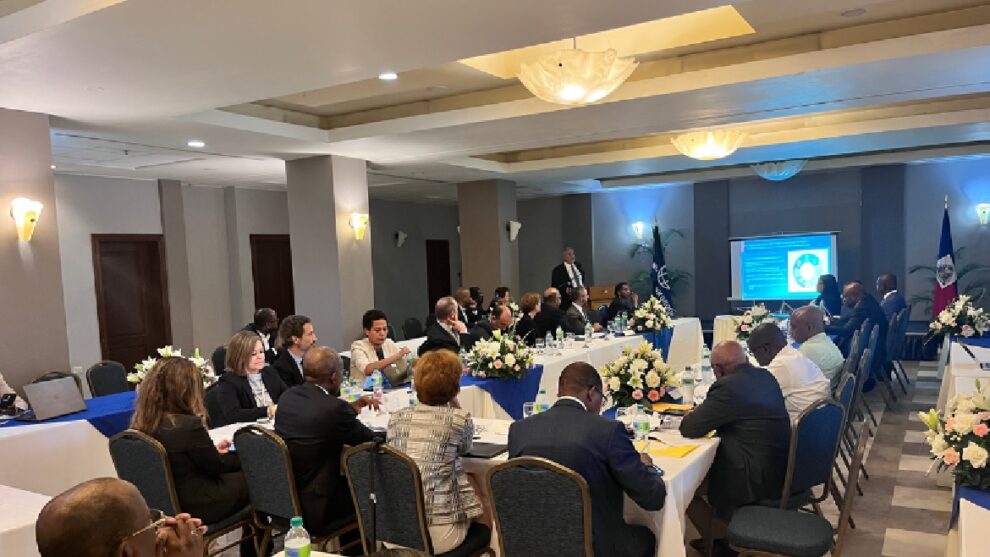A high-level delegation of the World Bank led by Ayat Soliman, Regional Director for Strategies and Operations, and including Lilia Burunciuc, Country Director for the Caribbean, Maria Marcela Silva, Regional Director for Infrastructure Practice Group, and Carolina Cardenas, International Finance Corporation’s Resident Representative for Haiti, visited Haiti from May 22nd to May 24, 2023. During their stay, the delegation met with Haitian Prime Minister, H.E. Ariel Henry, to renew the continued commitment of the World Bank Group (WBG) to the socio-economic development of the country and discuss current and future engagements.
Consultations were held with members of the cabinet, Governor of the Haiti Central Bank, development partners and private sector representatives on the potential priorities under a new Country Partnership Framework (CPF) that will guide WBG support to Haiti’s development efforts over the next five years (2024-2028). The Framework builds on the achievements and lessons from the ongoing programs of the World Bank Group.
“Thanks to significant financial and technical support from the World Bank Group, we have made remarkable progress in the areas of governance, agriculture, education, health coverage, and disaster management, and access to basic infrastructure such as rural transport, water and sanitation,” said Michel Patrick Boisvert, Haiti’s Minister of Finance. “This new partnership framework should enable the World Bank Group to continue to engage effectively with the country for the next five years. For us in the government, these consultations ensure that the new partnership framework is well aligned with the needs of the country and our identified priorities.”
Haiti faces deep structural challenges which are difficult to solve in the context of a protracted political and institutional crisis. The current deteriorating political, economic, social and security situation in Haiti requires a significant and concerted effort among key stakeholders to address urgent governance deficits and improve transparency. There is also the need to improve basic key services and economic opportunities, restore some degree of macroeconomic stability and public security, while identifying entry points for longer-term strategic engagements to address the fundamental drivers of fragility and opportunities for growth.
The combination of political crises, escalating gang violence, successive natural disasters and disease outbreaks in recent years have deepened Haiti’s fragility. This dialogue between Haitian authorities and development partners is a necessary step to explore pathways to breaking out of the crisis-fragility trap,” said Lilia Burunciuc, Country Director for the Caribbean. “Together, we should identify opportunities to help Haiti address its challenges, for the benefit of its people.”
The overarching goal of the Framework is to support Haiti at this critical juncture in its history in identifying pathways for restoring effective governance, sustaining basic public services, and resuming growth. “An important short-term priority in the current fragile context is preserving the livelihoods of vulnerable groups, while supporting the government to initiate reforms to address core drivers of fragility and other binding constraints to development and growth,” said Ayat Soliman, Regional Director Strategies and Operations, for whom Haiti was the first country she visited in her new capacity. “The restoration of stability in Haiti is a critical first step in a broader transition process to rebuild trust between the population and the government, break the cycle of chronic crises and unrest, and engage civil society, youth, and the private sector to move the country toward a more stable and prosperous future. Supporting Haiti’s development and improving the livelihood of the most vulnerable is a priority for the regional vice-presidency of the World Bank in charge of Latin America and the Caribbean.”
The delegation also made a plea for international partners to support the government in re-establishing security, the absence of which today is the main challenge faced by Haitians in their daily lives, and which is creating unmeasurable costs for the country in the form of violent deaths, kidnappings, lost jobs, and the departure of many skilled and professional people.
This visit was also the occasion for the World Bank to sign the US$ 80 million grant agreement with the Haitian government for the Decentralized Sustainable and Resilient Rural Water and Sanitation Project in Haiti, which aims to increase access to inclusive, resilient, and sustainable potable water services and increased access to basic sanitation services in the country’s small towns and rural communities.
“World Bank support in infrastructure is paramount in Haiti as it contributes to improved access to essential services and goods, all-weather connectivity and sustainable growth” said Rosemond Pradel, Minister of Public Works, Transport and Communication. “The construction and rehabilitation of road and airport infrastructure, improved access to water and sanitation, renewable energy and digital development, are among the priority actions supported by the World Bank and these are key transformative sectors for the revitalization of the local economy.”
The World Bank’s support to infrastructure development remains a major and strategic focus in Haiti. Over the past twenty years, the World Bank has provided critical support to Haiti in improving its infrastructure, including investments in key areas such as transport, water, and agriculture. These investments are crucial for integrated development aiming at improving the resilience of the most vulnerable rural communities providing better access to basic services and opportunities.
As of May 2023, the World Bank portfolio in Haiti comprises 18 active projects with a total amount of US$1.25 billion of which 38% is allocated to the infrastructure sector, supporting territorial balances and climate change adaptation.
Source : Reliefweb
















